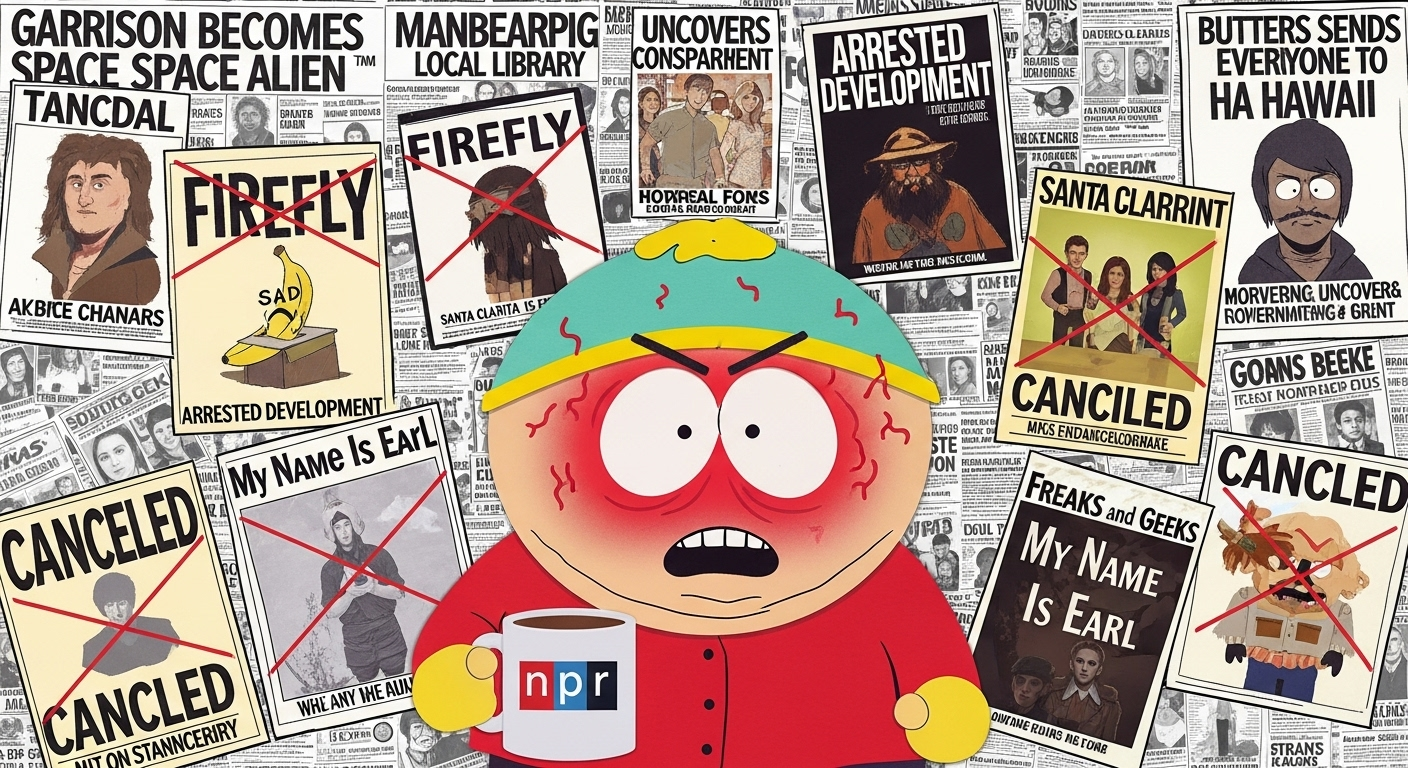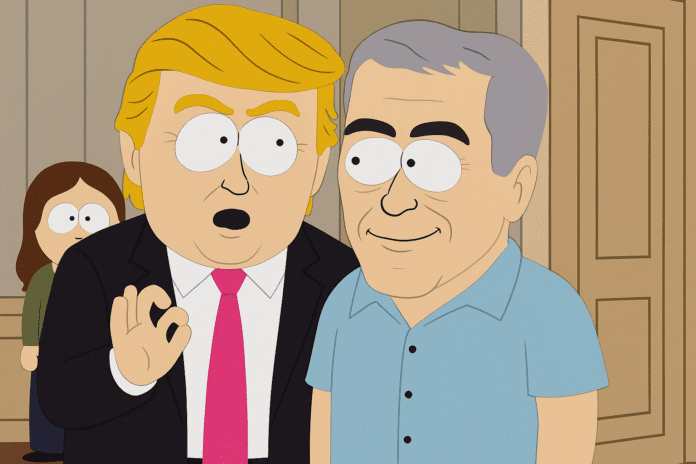How “South Park” Skewered Politics, Power, and Scandal in Its Wildest Comeback Yet
SPOILERS AHEAD: In its latest season premiere, South Park delivers an uproarious and daring satire that takes aim at Donald Trump, his alleged “teeny tiny” manhood, and ties to the Epstein scandal—while even Satan makes a guest appearance. This explosive episode, which aired on July 23, 2025, leaves no sacred cow unscathed. The story unfolds with a bold mix of political parody and irreverent humor that grabs the viewer’s attention from the very first scene.
The Return of South Park: Bold, Brazen, and Unapologetic
After a two-year hiatus and a blockbuster$1.5 billion streaming deal with Paramount+, South Park is back—and it’s proving that its satirical bite is as sharp as ever. The premiere episode, titled “Sermon on the ‘Mount,” wastes no time in lampooning current political scandals, blending real-world drama with the show’s signature absurdity.
Immediately, the episode sets the tone by skewering Trump as a narcissistic leader who, in a most surreal scene, ends up in bed with Satan. This outrageous scenario not only ridicules his ego but also jabs at rumors surrounding his alleged connection to Jeffrey Epstein. With hashtags like #SouthParkSeason27 and #TrumpAndSatan trending on social media, the premiere ignited debates across political and cultural lines.
What Really Goes Down in “Sermon on the ‘Mount”
The Trump-Satan Encounter
In one of the episode’s most talked-about sequences, former President Donald Trump finds himself engaging intimately with Satan. As the devilish figure coolly retorts with a barb about Trump’s “teeny tiny” manhood, the scene doubles as a metaphor for unchecked power and scandal. Trump’s absurd attempts to charm Satan—“Come on, Satan, you know you can’t resist this!”—spark laughter and disbelief among viewers, highlighting the show’s time-tested tactic of using hyperbolic humor to comment on our political landscape.
The Epstein Files and Scandalous Subplots
The narrative takes an even darker turn when Satan references the Epstein files, questioning Trump’s alleged presence on the infamous list. This subplot is not a mere throwaway; it underscores the pervasive nature of power imbalances and the corruption that often accompanies them. By mixing scandal with surreal comedy, South Park forces the audience to confront the often unspoken alliances between celebrity, politics, and crime.
A Riot at South Park Elementary
Not limiting its satire to political figures alone, the episode also takes aim at cultural controversies. In a subplot that sees Jesus Christ thrust into South Park Elementary as part of a bizarre lawsuit settlement, the town spirals into chaos. Parents protest and the community is torn, while Jesus awkwardly navigates his sudden role as the reluctant face of religious compromise. As one quip from the episode reminds us, “You saw what happened to CBS! You don’t want to end up like Colbert, do you?”
 Cartman’s Cynical Commentary
Cartman’s Cynical Commentary
Meanwhile, Cartman—ever the provocateur—laments the cancellation of NPR, a station he ironically admires for its supposed “wokeness.” In his inimitable style, he quips about government overreach and censorship, adding another layer to the multifaceted commentary on the culture wars that dominate public discourse today.
South Park’s Legacy of Unfiltered Political Satire
From Early Parody to Current Provocation
South Park has built its reputation on fearless, unrestrained commentary ever since it burst onto the scene in 1997. Earlier episodes, such as “Where My Country Gone?” provided blistering critiques of xenophobia and populism, foreshadowing the style and skill that would define the series. The new season’s premiere continues this tradition, using familiar characters and absurd scenarios to shine a light on today’s most divisive issues.
By repeatedly challenging the status quo—whether with outrageous portrayals of Trump or satirical takes on institutional power—the show remains a crucial mirror to contemporary society. Its blend of humor and hard-edged critique emboldens viewers to question everything from political authority to media narratives.
Satire in the Age of Streaming Deals
While the episode’s biting humor has sparked controversy, it also marks a turning point in television history. The transition from HBO Max to a sprawling Paramount+ deal is symbolic of shifting entertainment landscapes, where streaming rights and corporate negotiations increasingly shape what viewers see. With an estimated annual value of$300 million, the new streaming deal underscores the cultural and economic significance of South Park in any conversation about modern media.
Audience and Critical Reaction: Laughter, Outrage, and a Dash of Legal Drama
Critical Acclaim and Sharp Commentary
From the first broadcast to the ensuing social media storm, critics have marveled at the episode’s audacity. Publications like The Hollywood Reporter and Variety hailed it as “a satirical masterclass” that not only revisits the show’s roots but also redefines them for a turbulent political era. Even as conservative critics denounced the episode as “tasteless,” its defenders argue that its fearless approach is precisely what keeps satire vital.
Audience Engagement and Viral Moments
Fans took to Twitter and Instagram, heartily sharing memes, video clips, and witty remarks. One viral tweet quipped, “I give it 15 minutes before Trump starts contemplating a lawsuit against Comedy Central!” Another popular post showcased a split-screen image of Trump and Satan, with the devil’s sardonic smile commenting on the absurdity of it all. These digital discussions have not only amplified the episode’s reach but have also turned it into a cultural touchstone—one that is as polarizing as it is entertaining.
Notable Legal and Corporate Challenges
Despite the overwhelming buzz, the episode did face legal threats and stern criticisms from political figures. Conservative groups questioned the propriety of using real-life scandals for humor, while representatives for Trump hinted at the possibility of legal action. Yet, true to form, South Park has always pushed boundaries, and its creators, Trey Parker and Matt Stone, remain defiant. “We’ve always believed that if you’re going to make fun of something, you have to go all the way,” they declared, and they certainly did so this season (Deadline).
Why This Premiere Matters More Than Ever
A Mirror to Modern Scandal and Pop Culture
At its core, the Season 27 premiere is about more than just crude gags or outrageous plot twists. It is a commentary on the state of modern politics and media, where scandal, celebrity, and power intermingle in bewildering ways. By drawing parallels between Trump’s political theatrics, the Epstein scandal, and the simplified mythologies of religion and media, South Park invites its audience to laugh—but also to reflect on the absurd reality of contemporary life.
A Call for Critical Engagement
In an era when political polarization seems more intense than ever, the show’s unabashed ridicule of powerful figures is a reminder not to take authority at face value. While some may see the episode as nothing more than crude humor, its underlying message is clear: no one, no matter how revered or reviled, is beyond the scope of satire.
Embrace the Satire and Join the Conversation
South Park Season 27 is proof that fearless satire can still challenge our preconceptions and spark meaningful debate. By skewering Donald Trump, weaving in the Epstein scandal, and orchestrating scenes where even Satan plays a leading role, the show secures its place as an essential voice in today’s media landscape.
As you reflect on the hilarity and shock of this premiere, consider what it means for our society. Are we too easily swayed by appearances and scandals? Or does humor serve as a vital tool for exposing hypocrisy? The conversation is as important as it is entertaining.
Ready for more? Dive into the new season on Paramount+ and join the discussion on social media. Whether you’re laughing at the “teeny tiny” jokes or pondering deeper social issues, South Park’s unapologetic mockery is here to remind us that humor can be a powerful force for change.




